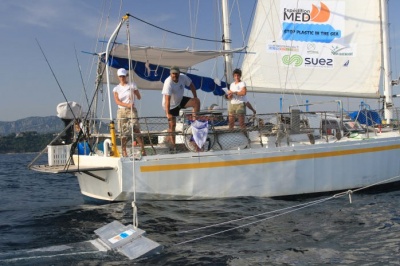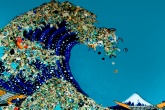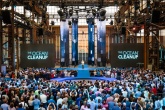Mediterranean expedition embarks on study of 'marine plastisphere'
A two-month expedition to study the ‘plastisphere’ of the Mediterranean Sea departed from the coast of Italy on Thursday (22 June), as scientists seek to study how the alarming formation of a plastic-based marine ecosystem will affect the sea and humans.
 The plastisphere is an ecosystem of microorganisms and bacteria that colonise and live on micro-fragments of degraded plastic. The concept was discovered by marine biologists Linda Amaral-Zettler and Erik Zettler several years ago.
The plastisphere is an ecosystem of microorganisms and bacteria that colonise and live on micro-fragments of degraded plastic. The concept was discovered by marine biologists Linda Amaral-Zettler and Erik Zettler several years ago.
According to research, these microorganisms and bacteria feed on plastic particles and can transform themselves into microbial barriers, which are then entirely distinct from surrounding biological communities. It is thought that these microorganisms could colonise plastic waste within thirty minutes of it reaching the sea, potentially contaminating any fish farms that it floats into.
The Expédition MED 2017 team, made up of scientists, oceanographers and volunteers, will study this habitat to see how it can play a key role in the aggregation and transport of toxic chemical substances and microorganisms that could invade ecosystems and damage the health of humans further up the food chain.
The expedition, on board the Ainez, embarked from the Roman port of Fiumicino on Thursday and will sail until 19 August, covering around 2,000 nautical miles in the Tyrrhenian Sea (between Italy and Sicily), the southern Mediterranean, the Ionian Sea (between Italy and Greece) and finally the Adriatic Sea, one of the areas with the highest density of plastic waste (one in three loggerhead turtles in the area are thought to have plastic in their intestines).
Expédition MED (Mediterranean in Danger), which has been supported by Italian bioplastics producer Novamont and European waste firm SUEZ ENVIRONNEMENT, aims to develop an international network of research centres and environmental associations focused on studying plastic waste.
Its founder, Bruno Dumontet said: “Since its creation 60 years ago, plastic waste has taken over the planet. The recycling and recovery of plastic waste has only recently become prevalent, and today we are suffering the consequences. Many people think that this pollution is the responsibility of coastal populations – that is not the case! 80 per cent of the waste found in the sea comes from inland, sometimes very far inland, but it is carried out to sea in rivers and by the wind.”
‘Sly, invisible pollution’ could have catastrophic effects on the sea
The issue of ocean plastics has become a hot topic, with several high profile projects designed to remove plastic from the sea and coastal communities, in particular the Ocean Cleanup, which is developing a floating set of booms to deploy in the Great Pacific Garbage Patch and capture tens of thousands of tonnes of floating plastic.
 Dumontet says that while the Mediterranean doesn’t contain the same mass of plastic as the Pacific Ocean, the impacts on the marine ecosystems are just as dramatic: “There isn’t a large area of waste like the seventh continent in the Pacific. The situation is less spectacular, but no less dramatic: microplastics are everywhere.
Dumontet says that while the Mediterranean doesn’t contain the same mass of plastic as the Pacific Ocean, the impacts on the marine ecosystems are just as dramatic: “There isn’t a large area of waste like the seventh continent in the Pacific. The situation is less spectacular, but no less dramatic: microplastics are everywhere.
“It’s a sly, invisible pollution which has catastrophic effects on marine wildlife. As it disintegrates, the plastic merges with plankton, meaning some fish may be killed and others contaminated. This is because plastic, like a sponge, has the capacity to absorb all the pollutants it encounters. Our studies are aimed at understanding the extent of the risk of fish ingesting these substances, which puts the health of our oceans, and consequently our own health, in danger.
“Every summer people swim in the sea without realising that, if nothing is done, in just a few decades it will most likely no longer be possible to swim in the sea. The Mediterranean risks becoming a dead sea if we do not stop this pollution. However, I remain confident for the future, as solutions exist and we can still act to reverse the trend.”
Dumontet hopes that the new expedition will raise awareness of the marine plastic issue and aims to collect one million signatures on a ‘Stop plastic in the sea’ petition, which is the number needed to put plastic pollution on the European Parliament’s agenda.
More information about Expédition MED can be found on the organisation’s website.








